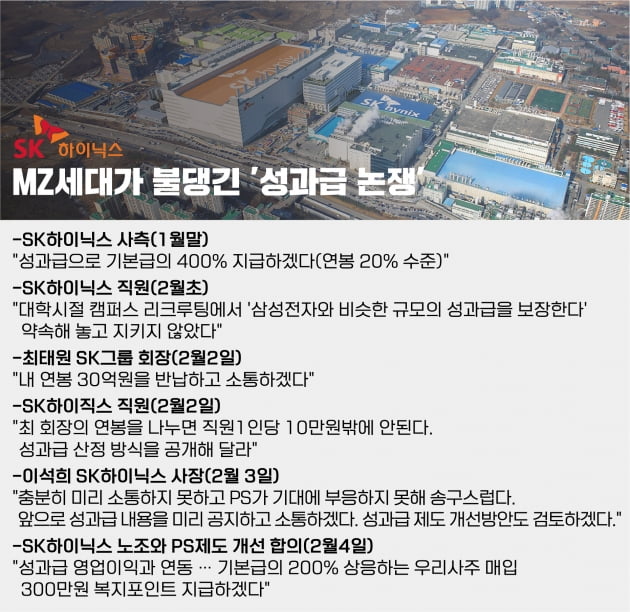The debate on performance pay that started at SK Hynix has ended.
On the 4th, SK hynix labor and management agreed to transparently change the calculation criteria for excess profit incentives (PS) and provide employees with employee stock shares equivalent to 200% additional basic pay. In addition, it was decided to pay 3 million in-house welfare points. The controversy triggered by SK Hynix spread to other companies and became dissatisfied with “Why should we receive less because our company has made a lot of profits?”

◆’SK hynix’s debate over performance pay
The triggering point of the performance pay debate came from the problem of communication with the MZ generation.
On January 28 of this year, SK Hynix announced, “We will pay 400% of the basic salary as an incentive.” This was 20% of the annual salary, which was less than half of the DS employee’s incentive pay (47% of the annual salary) of Samsung Electronics’ semiconductor division.
Accordingly, SK Hynix’s fourth-year employees asked about 28,000 people to “disclose the standards for calculating performance pay transparently” through the in-house bulletin board and e-mail. Another employee said, “When I was recruiting on campus in college, I professed to’guarantee an incentive pay similar to that of Samsung Electronics’, but it was not kept.”
As the controversy grew, SK Group Chairman Choi Tae-won declared, “I will return the entire amount of 3 billion won in annual salary received from SK Hynix last year and share it with employees.” However, young employees pressured the company, saying, “Chairman Choi’s annual salary is only 100,000 won per person. We ask you to transparently disclose the method of calculating the incentive pay.”
Accordingly, SK Hynix President Lee Seok-hee said, “We apologize for not being able to communicate enough,” and “We will focus on fairness and transparency in the future management direction.” In addition, he emphasized that he would announce the contents of incentives in advance and promote system improvement if necessary.
On the 4th, SK Hynix’s labor and management promised to link incentives to operating income, pay additional incentives, and make the method of calculating incentives transparent, and close the conflict.
MZ (born in 1965-1976) refrained from remarks that could spark controversy because incentive pay was perceived as’what the company gives,’ but this’incentive pay debate’ emphasizes transparency and fairness. It can be interpreted as reflecting the characteristics of generations.

◆Samsung, LG incentive controversy
The controversy over performance pay has spread to other companies. The employees of LG Energy Solutions, a battery company that was spun off from LG Chem in December of last year, complained about the company’s plan to pay 245% of the average base salary as an incentive. The company’s employees complained, “Last year’s highest performance was achieved, but rather less than the parent company (400% basic salary for LG Chem petrochemical division, 300% basic salary for life science division).
Samsung Electronics is no exception. Samsung Electronics has different incentives for each business division. The semiconductor division pays 47% of this year’s annual salary, while the video display division (VD) and the IM division that makes smartphones will receive 50% of the annual salary. Accordingly, employees in the semiconductor division confessed, “Semiconductors earned more than half of the operating profit, but the incentives were rather small.”
SK Telecom also announced on the 3rd that it would pay incentives by choosing between cash and treasury stocks, but the union demanded a complete reorganization of the payment method, saying that the incentives are expected to decrease significantly compared to the previous year. Accordingly, SK Telecom decided to form a TF to improve performance on the 15th after Lunar New Year. The improved standards for incentive payments will be applied from 2022.
Regarding the controversy over incentive pay, many HR experts view that’incentive pay is a separate wage according to management performance, and the timing and ratio are generally decided by management.’ Hong Seok-hwan, CEO of HR Strategy, said, “Because incentives can vary depending on business conditions, transparency in communication through company management presentations, etc. is more necessary than transparency in payment standards.” Some point out that the performance-based culture of Korean companies is running counter to global companies. Rebox Consulting CEO Jeong Tae-hee said, “Netflix has a regular evaluation and compensation system for each employee. In order to compete with global companies, a culture in which incentives are paid based on individual expertise and achievement, not the company’s performance, must be established as soon as possible.” He emphasized.
Reporter Gong Tae-yoon [email protected]
